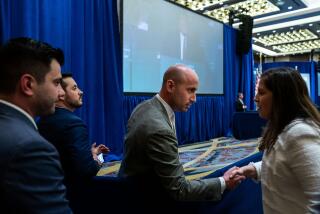Firm Solves Others’ Personnel Problems : Human resources: Partners offer services on a contract basis to companies too small to have their own experts on benefits, hiring, training and government red tape.
- Share via
LEVITTOWN, N.Y. — Martin Gelerman was the head of personnel in a large company that made an enormous blunder involving its employees. It was the worst of decisions for a few hundred people, and Gelerman is glad about two things: He didn’t make the decision and it forced him to think again about his career.
The result was fortuitous, as forced changes sometimes are, and Gelerman at 53 is now chairman of a firm mining a rich niche in the fields of personnel and human resources. He and his partner, Jack Roche, 43, offer a portable personnel department to small companies that otherwise couldn’t afford a personnel officer, and to mid-size companies that grew up without one.
“There’s a need out there,” Gelerman says.
Their 3 1/2-year-old company, Martin-Roche Associates Inc., has 56 clients, ranging in size from 25 employees to 350 except for a couple of big-name companies that are thinking about downsizing their in-house personnel operations. The partners are on the verge of franchising their concept and, as with all would-be magnates, theirs is a grand vision. It is supported by the fact that most of American business is done by small companies.
A company doesn’t have to be big to be confused by the protocols that govern the increasingly delicate relationships between employers and employees. The complexity has increased in the past two decades along with the number of federal “people laws” that come with handles like EEO, OSHA, ERISA, IRCA and COBRA. There also is the tax-reform labyrinth of 1986, which made everything knottier.
It has all gotten so complicated, not to mention strategic, that the function has changed as much as its name. You may have noticed the metamorphosis from “industrial relations”--which essentially was a foreman on a hiring dock--to “employee relations” to “personnel” to “human resources.” The latter is said to grasp both the routine and the big picture.
The idea for a contract human-resources company came to Roche in 1982, when he was manager of employment relations for a publishing house that moved to Florida.
“I had three benefits people working for me,” says Roche. “I had three people who did nothing but employment. I had two compensation people. I had a trainer who did management development. Then one day, sitting in my corner office overlooking 3rd Avenue, I realized companies out there have the same problems we do. They abide by the same laws that we do, and have to compete in the same labor market we do, and they don’t have the luxury of having this humongous personnel department. It dawned on me that there might be a niche out there.”
Four years later, they took the plunge. Roche was director of personnel for a national law firm and Gelerman was vice president of personnel and administration for Executone Inc., whose move from Jericho to Georgia set the stage for the company’s collapse. It subsequently was sold and merged with two other companies; the three of them remain in the telecommunications-equipment business under the Executone name.
Like 198 of Executone’s 264 headquarters employees, Gelerman chose not to go along. “From a human viewpoint, it was a terrible occurrence. A lot of people got hurt very badly.”
Within three weeks of starting Martin-Roche in Roche’s basement, they had four clients, Gelerman says. Last year the company grossed more than $1 million.
Martin-Roche appears ahead of the curve, but competitors are noticing both the niche and the change in corporate philosophy that gets them in the door. There is, for example, the crossover being attempted by Paychex Inc., a Rochester, N.Y., company grossing $100 million last year on payroll processing. It is now testing a “personnel services division” in New York, Ohio and California that it hopes to parlay with its 100,000 small-business clients.
Martin-Roche works three ways. It will do projects, such as producing an employee manual, for $150 an hour, but its focus is on broader service. For a minimum of $28,000 a year, a client gets a Martin-Roche consultant at its site two half-days a week. For $54,000, the client gets a person on its premises full time. In both cases, there is much work behind the scenes and Martin-Roche’s range of expertise is on call. The firm has 26 employees, 18 of whom are at clients’ sites in New York and seven other states.
“They have labor problems or employee-law problems, or problems in recruiting, or morale problems, or they have a turnover, or they’re paying too much for benefits, or they don’t know how to structure an executive-compensation package,” Gelerman says. “They can’t afford a specialist in each of these areas. In some cases, they can’t even afford a single person.”
Small clients often, and at their peril, have no written personnel policies, which can lead to conflict, lawsuits and even indictments. Roche and Gelerman say their firm cuts both ways in the economy. In growth and full employment, it tracks hard-to-find employees and offers strategic help in keeping ahead of the expansion. In tough times, the question is how to contract. “They have to have a lesser payroll. So the conversation is: What jobs can you do without? Can you cut back on any of your direct labor and, accordingly, on what support staff. . . . Should we be adding somebody in sales instead of cutting back? Or should we be doing both?”
More to Read
Inside the business of entertainment
The Wide Shot brings you news, analysis and insights on everything from streaming wars to production — and what it all means for the future.
You may occasionally receive promotional content from the Los Angeles Times.










